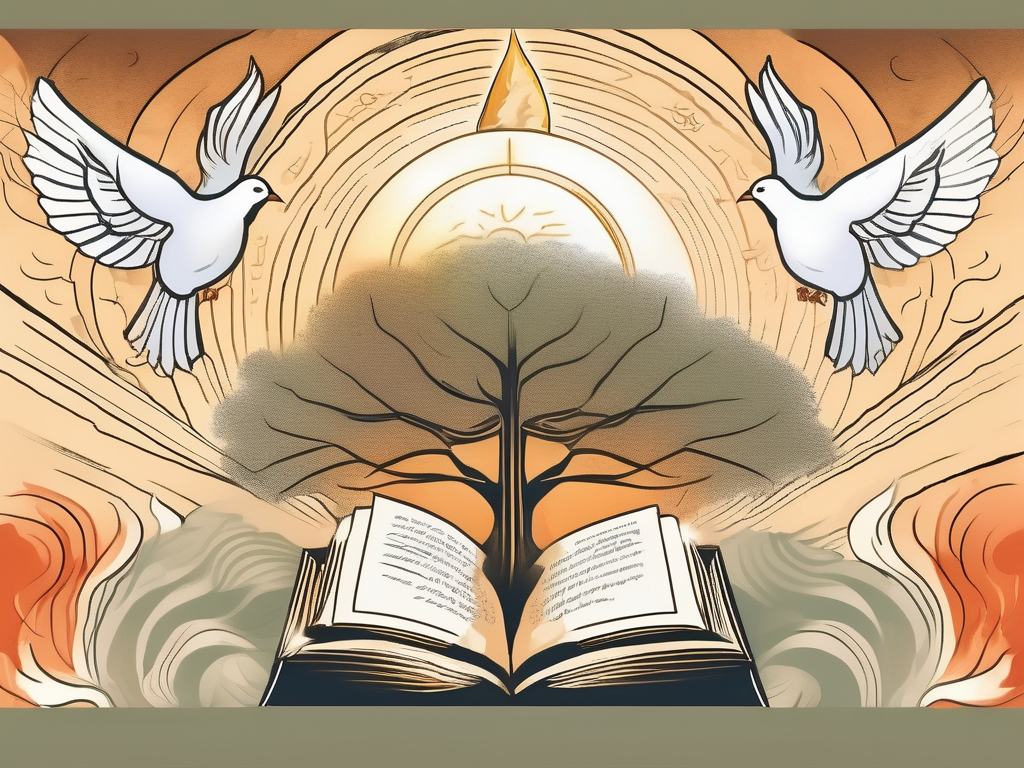Isaiah the Prophet is undoubtedly one of the most revered and influential figures in biblical history. His prophecies, teachings, and life story continue to captivate the hearts and minds of believers across different religious traditions. In this article, we will delve into the various aspects of Isaiah’s legacy, exploring his role in biblical history, his theological impact, his influence on literature and art, the controversies surrounding his work, and the enduring relevance of his message in contemporary society.
Understanding Isaiah’s Role in Biblical History
Isaiah’s prophecies hold immense significance in the scriptures. His messages were divinely inspired and offered valuable insights about the future of Israel and the significance of righteousness. Through his prophetic visions and poetic expressions, Isaiah conveyed the divine will to his people, urging them to repentance and forewarning them of the consequences of their actions.
The life and times of Isaiah were marked by turbulent events, such as the fall of the Northern Kingdom of Israel and the rise of the Assyrian Empire. As a messenger of God, he fearlessly confronted corrupt leaders, championed the cause of justice, and provided comfort to the suffering masses. Isaiah’s unwavering dedication to his prophetic mission made him a trusted and respected figure in ancient Israel.
Isaiah’s prophecies were not limited to his own time but extended far into the future, providing a glimpse into the coming Messiah and the ultimate redemption of mankind. His words resonated with the people of Israel, offering hope and reassurance in times of despair. Through his eloquent and powerful language, Isaiah painted vivid pictures of a future where righteousness would prevail and peace would reign.
One of Isaiah’s most famous prophecies is found in Isaiah 9:6, where he foretells the birth of a child who would be called “Wonderful Counselor, Mighty God, Everlasting Father, Prince of Peace.” This prophecy, often associated with the birth of Jesus Christ, speaks of a divine figure who would bring salvation and establish an everlasting kingdom. Isaiah’s words became a source of comfort and anticipation for generations to come.
Isaiah’s role as a prophet was not an easy one. He faced opposition and persecution from those who rejected his message and refused to heed his warnings. Yet, he remained steadfast in his faith and continued to proclaim the word of God with unwavering conviction. His prophecies were not mere predictions but served as a call to action, urging the people of Israel to turn away from their sinful ways and return to God.
Throughout his book, Isaiah addresses various themes such as justice, mercy, and the importance of true worship. He emphasizes the need for social justice and condemns the exploitation of the poor and vulnerable. Isaiah’s words echo through the centuries, reminding us of our responsibility to care for the marginalized and to seek righteousness in all aspects of our lives.
Isaiah’s influence extends beyond the pages of the Bible. His prophecies have inspired countless artists, musicians, and writers throughout history. His words have been set to music, creating powerful hymns and songs that continue to be sung in churches and concert halls around the world. The timeless relevance of Isaiah’s message continues to resonate with people of faith, offering guidance and inspiration in their spiritual journeys.
In conclusion, Isaiah’s role in biblical history cannot be overstated. His prophecies, filled with divine wisdom and insight, continue to captivate and challenge readers today. Through his unwavering dedication to his prophetic mission, Isaiah became a trusted and respected figure in ancient Israel. His words offer hope, comfort, and guidance, reminding us of the enduring power of faith and the importance of righteousness in our lives.
The Theological Impact of Isaiah’s Teachings
Isaiah’s teachings have left an indelible mark on Christian beliefs. The New Testament extensively quotes his prophecies, particularly those related to the birth and ministry of Jesus Christ. Christians see Isaiah’s prophecies as a foreshadowing of the coming of the Messiah and find solace in his messages of hope, redemption, and the ultimate triumph of good over evil.
In Jewish tradition, Isaiah is venerated as one of the major prophets whose words continue to resonate with believers. His inspiring vision of a future Messianic era, characterized by peace, justice, and the universal knowledge of God, serves as a beacon of hope for Jewish communities throughout history.
Let us delve deeper into the theological impact of Isaiah’s teachings. One of the key aspects of Isaiah’s prophecies is their relevance to both the past and the future. Isaiah’s words not only spoke to the people of his time but also provided guidance and inspiration for generations to come.
Isaiah’s prophecies about the birth and ministry of Jesus Christ have been a cornerstone of Christian theology. The New Testament writers saw Isaiah’s words as fulfilled in the life of Jesus, reinforcing their belief in his divinity and messianic role. The prophecies of Isaiah, such as the famous “Immanuel” prophecy, which foretold the birth of a child who would be called “God with us,” provided Christians with a profound understanding of Jesus’ identity as the Son of God.
Furthermore, Isaiah’s messages of hope and redemption have been a source of comfort for countless believers throughout history. In times of despair and uncertainty, Christians have turned to Isaiah’s prophecies, finding solace in his assurance of God’s faithfulness and the ultimate victory of good over evil. Isaiah’s words have provided a foundation of hope, reminding believers that even in the darkest of times, God’s plan for salvation will prevail.
In Jewish tradition, Isaiah’s teachings hold a special place as well. His prophecies of a future Messianic era, characterized by peace, justice, and the universal knowledge of God, have been a source of inspiration and longing for Jewish communities throughout the centuries. Isaiah’s vision of a world where swords are turned into plowshares and nations come together in harmony resonates deeply with the Jewish belief in the coming of the Messiah and the establishment of God’s kingdom on earth.
Isaiah’s teachings have also influenced the development of theological concepts such as eschatology, the study of the end times. His prophecies about the future restoration of Israel and the establishment of God’s kingdom have shaped the understanding of the final culmination of God’s plan for humanity. The hope and anticipation of a future Messianic era, as described by Isaiah, continue to inspire theological discussions and reflections on the ultimate purpose and destiny of humanity.
In conclusion, Isaiah’s teachings have had a profound theological impact on both Christian and Jewish beliefs. His prophecies, particularly those related to the birth and ministry of Jesus Christ, have provided a foundation for understanding the divinity and messianic role of Jesus. Additionally, Isaiah’s messages of hope, redemption, and the future Messianic era have served as a source of inspiration and guidance for believers throughout history. The theological significance of Isaiah’s teachings continues to be explored and appreciated, offering profound insights into the nature of God’s plan for humanity.
Isaiah’s Legacy in Literature and Art
Isaiah’s profound influence extends beyond religious discourse and permeates the world of literature and art. Artists and writers throughout history have sought inspiration from his prophecies, creating powerful visual and written depictions of his life and messages.
Religious art frequently depicts Isaiah as a venerable figure, often holding a scroll with his prophecies. These artistic representations portray him as a conduit of divine revelation, connecting the spiritual realm with the earthly plane. The depictions of Isaiah serve as a reminder of the spiritual heights that humanity can aspire to and the transformative power of faith.
Furthermore, literary references to Isaiah’s prophecies abound in works of fiction, poetry, and even contemporary music. Authors and poets have drawn upon his words to convey themes of hope, social justice, and spiritual awakening, thus keeping his legacy alive in the realms of literature and creative expression.
Controversies and Debates Surrounding Isaiah
Given the complexity and profound nature of Isaiah’s prophecies, scholars have engaged in rigorous interpretations and spirited debates concerning their meaning. The diverse perspectives on the prophecies have resulted in a rich tapestry of scholarly literature examining their historical context and theological implications.
One area of debate has been the authorship of the Book of Isaiah. Some scholars argue that the book was written by multiple authors over several centuries, while others maintain that it was the work of a single prophet named Isaiah. The discussion surrounding authorship does not diminish the significance of the book but rather adds layers of complexity to its interpretation.
Moreover, questions have been raised regarding the historical accuracy of Isaiah’s life and his prophecies. These controversies provide fertile ground for scholarly inquiry and reflect the ongoing quest for a deeper understanding of Isaiah’s messages in the context of the ancient world.
The Enduring Relevance of Isaiah’s Message
Despite the passage of centuries, Isaiah’s message continues to resonate with a diverse range of individuals and communities. His teachings have transcended the boundaries of time and cultural context, speaking to the core of the human experience.
In modern religious thought, Isaiah’s prophecies offer a source of guidance and inspiration. His calls for justice, compassion, and the pursuit of righteousness remain as relevant today as they were in ancient times. Isaiah’s words challenge individuals and societies to examine their actions, promote justice, and strive for a world characterized by peace and harmony.
Beyond religious circles, Isaiah’s influence can be seen in contemporary culture. His messages of hope and resilience find echoes in various forms of media, such as music, film, and literature, offering solace and encouragement to individuals navigating the challenges of the modern world.
In conclusion, Isaiah the Prophet stands as a saintly figure in history, his significance extending far beyond his role in biblical narratives. His prophecies, theological impact, artistic depictions, controversies, and enduring relevance all contribute to his status as a revered figure. Isaiah’s teachings continue to inspire and guide individuals and communities, making him a timeless source of wisdom and spiritual enlightenment.












